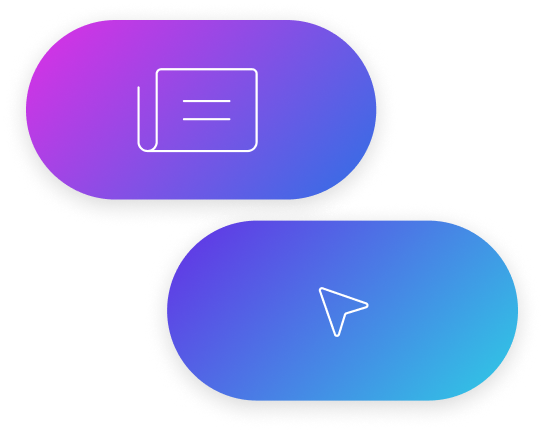“eSIMs will start approaching critical mass in the consumer market next year [in 2025]”. That was one of the top 10 mobile predictions for 2025 by Mobile Magazine. And we couldn’t agree more!
As the eSIM market is booming, businesses within telco but also across other industries are looking for ways to tap into its potential. Whether you’re a fintech, a travel brand, or a telecom provider, the right approach can open new revenue streams. But with so many options, how do you decide?
There are three main ways to get involved in the eSIM market: affiliate programs, reseller programs, and eSIM SDKs. Each has its perks, but not all are created equal. Some offer quick, easy earnings, while others give you full control and long-term profitability.
This blog breaks down the differences so that you can choose the best eSIM solution for your business.
TL;DR
- What are eSIM affiliate programs? A low-commitment way to earn commissions by promoting eSIM services via referral links.
- What are eSIM reseller programs? A program whereby you buy eSIMs at wholesale rates and resell them under your brand.
- What’s the difference between an eSIM reseller program and a white label eSIM app? An eSIM reseller program lets you sell eSIMs under your brand but relies on the provider’s platform, while a white label eSIM app gives you a fully branded app, complete customer ownership, and full control over pricing and user experience.
- What is an eSIM SDK? A software toolkit that lets businesses integrate eSIMs directly into their own app.
- Why is eSIM SDK the best option? It provides full control over branding, pricing, and user experience, enabling seamless remote SIM provisioning within your own app while maximising scalability and revenue potential.
What Are eSIM Affiliate Programs?
Affiliate programs are the easiest way to dip your toes into the eSIM market. You simply promote an existing eSIM service (usually through a unique referral link or QR code), and every time someone signs up, you earn a commission.
Most eSIM providers in the market, from Airalo to Saily, offer an affiliate program, so the choice is vast (we’ve counted at least 30 of them). Just google (if you’re still doing that in the age of AI) “eSIM affiliate program”, and you’ll be faced with an abundance of options.
When we think of “affiliate program”, influencers and other individuals with large audiences come to mind. However, affiliate programs are also suitable for businesses, especially those revolving around travel services, such as booking sites, travel insurance providers, travel agents and other companies that want to offer a new ancillary service and generate a passive income stream without the hassle of customer management.
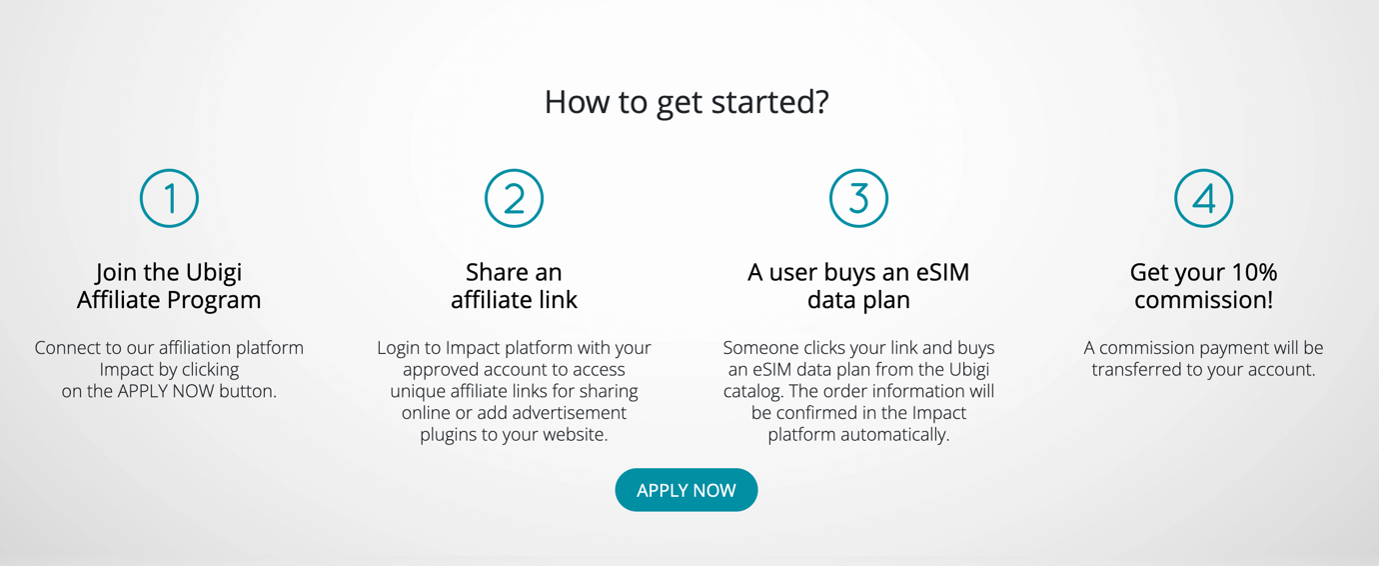 Source: Ubigi
Source: Ubigi
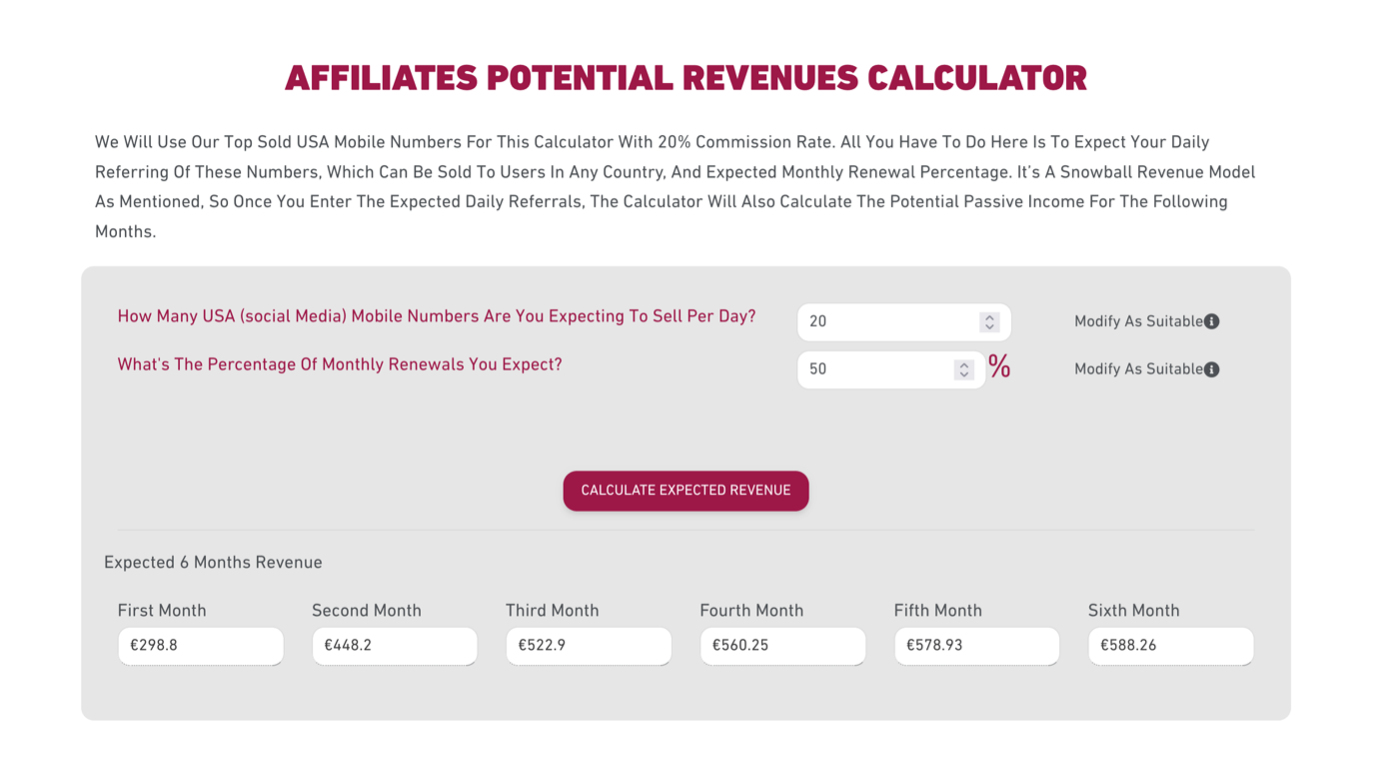 Source: Numero eSIM
Source: Numero eSIM
Pros:
- No upfront costs.
- Quick sign up through an eSIM provider website to get your unique link and start sharing it with your audience.
- No need for customer support.
- Earn commission on every sale.
Cons:
- Limited control over pricing and branding.
- Commissions between 10% and 20%.
- Earnings depend on how well you market the service.
- No direct customer relationship.
Affiliate programs are a simple and easy way to generate ancillary revenue and are ideal for individuals or businesses just testing the waters or wanting an effortless solution. But if you’re looking for deeper involvement and higher margins, you might want to explore other options.
What Are eSIM Reseller Programs?
Reseller programs take things up a notch. Instead of just referring customers, you sell eSIMs directly under your own brand. This gives you control over pricing and marketing while leveraging an existing eSIM provider’s infrastructure.
eSIM reseller programs include these 3 key elements:
- Dashboard* – a place where you can manage eSIMs, track usage, generate reports, and more.
- Wholesale pricing** – buy eSIMs at a discounted price and create your own pricing.
- White label app*** – a pre-built app tailored to your brand identity through which you can sell eSIMs to your customers.
There are a few caveats to be aware of, though. Let’s unpack them.
*Not to be confused with a telecom CRM. A CRM is a more robust customer management tool offering a wider spectrum of features. In the case of eSIM reseller programs, you get a reseller dashboard, which is a skimmed version of the CRM that mainly lets you control your eSIM stock and pricing, track customer activity, and generate reports. Additionally, a CRM gives you full control over all of its parts and features, whereas some of the eSIM resellers handle some activities for you. For example, eSIMCard can handle all customer support matters for you.
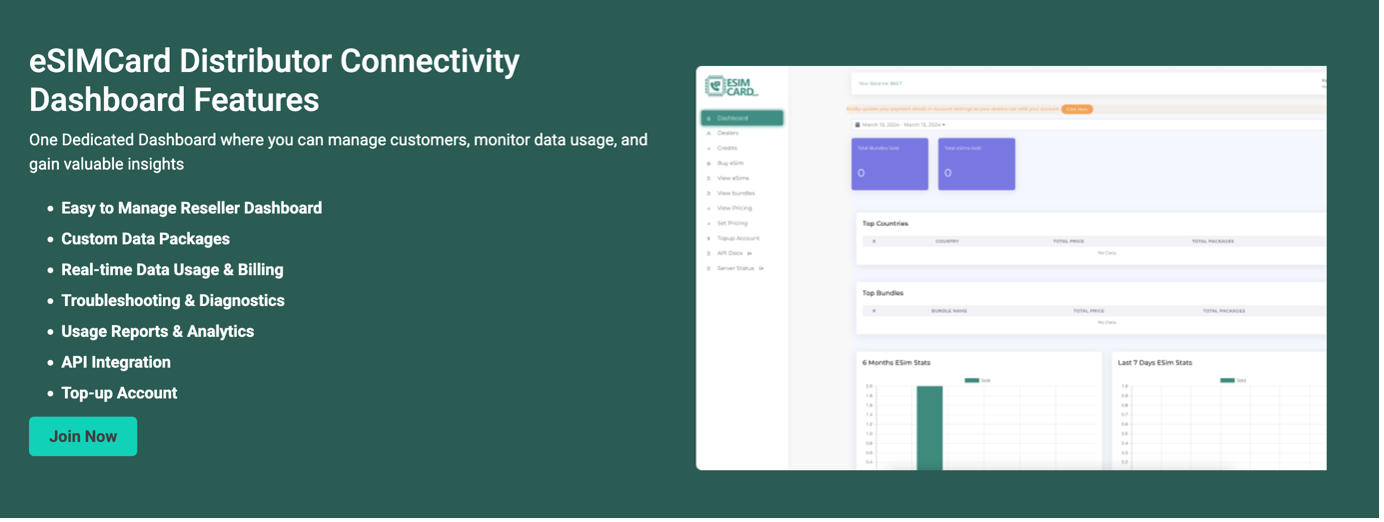 Source: eSIMCard
Source: eSIMCard
**You buy eSIMs at wholesale rates and resell them at a markup. Some reseller program providers allow you to customise data packages by the amount of data, the duration of the plan, or by letting you choose regional plans instead of individual countries (esim.sm, eSIMCard), while others offer data in pre-defined bundles (eSIMaccess). However, by becoming a reseller, eSIMs are your only revenue stream. You can’t expand or provide other services within the same app.
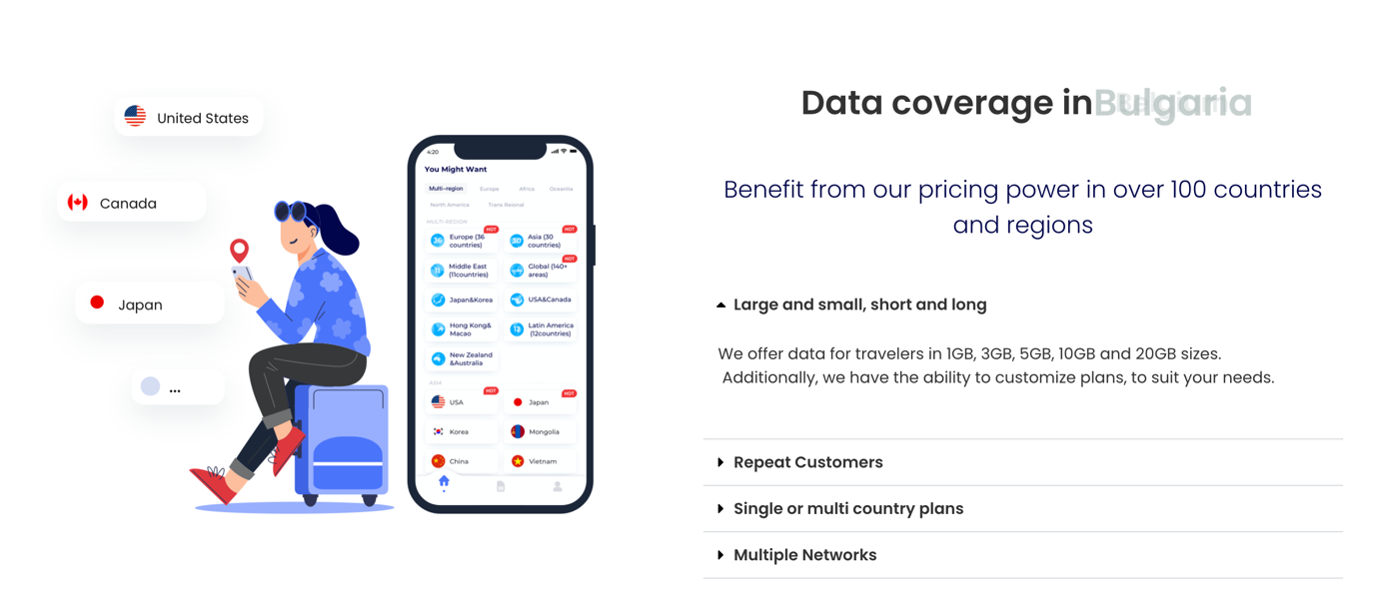 Source: eSIMaccess
Source: eSIMaccess
***What reseller program providers call a white label eSIM app is a generic version of their own app (or the eSIM store, to be more specific), updated with your logo and high-level brand identity. Alternatively, they offer to add the eSIM store to your existing website through APIs or plug-ins. No development is needed, but you have no control over the user experience and many other aspects of the app.
 Source: Maya
Source: Maya
With all that being said, there is a solution that offers all of these features that reseller programs don’t. It’s called a white label eSIM app (the real one, I mean).
With it, you get a fully branded app that looks and feels like your own product. You have full control over the UI, customer journey, and branding, but it’s still powered by the provider’s technology.
The customers are yours – you manage the entire experience, from acquisition to support, without redirecting them to another platform. You have more pricing control and can create an entire digital ecosystem that’s scalable.
You can expand by adding features like VoIP services, loyalty programs, subscription models, or 3rd party services. Mobilise offers a white label eSIM app, which you can find out more about here.
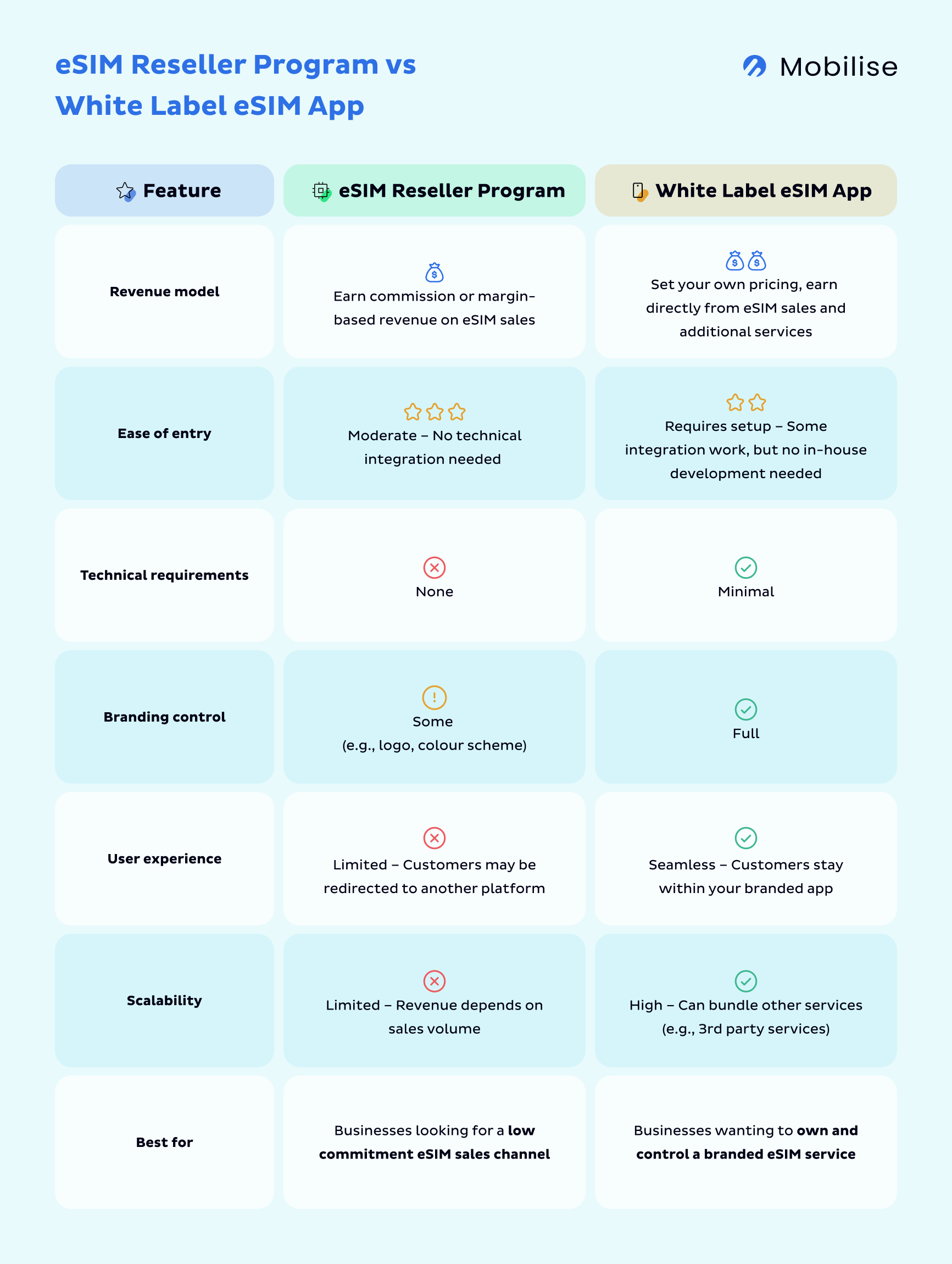
Pros:
- Higher revenue potential compared to affiliates.
- Custom branding opportunities.
- Stronger customer relationships.
- Great option for providers that only want to sell eSIMs.
Cons:
- Requires investment in marketing and customer service.
- Limited backend control (you still rely on the eSIM provider’s platform).
- No opportunity to add new revenue streams.
To summarise, by becoming a reseller, you distribute and resell the provider’s eSIMs to your audience. It’s a great and effortless way to generate a new revenue stream while keeping things simple. However, if you want full control over pricing, user experience, and backend functionality, you’ll need an eSIM SDK.
What is an eSIM SDK?
A mobile eSIM SDK is the most powerful way to integrate eSIMs into your business. Instead of relying on third-party platforms, you can embed eSIM functionality directly into your app.
It may sound difficult, but it’s not. The SDK is a plug-and-play solution that connects with your app through APIs. You don’t have to know a thing about telecoms or perform any complex integrations and still offer a top-notch eSIM user experience.
Mobilise offers a mobile eSIM SDK, and the key features include:
- API-based integration with any codebase.
- Instant access to APIs – we sign the deal, and 5 minutes later, you have full access to the APIs.
- Carrier and SM-DP+ agnostic – we can bring in our partners, or you can choose your own.
- Custom data bundles – you can customise anything: data amount, duration, regional or global coverage.
- In-app eSIM download, install and activation for a 5-star eSIM user experience.
- One eSIM for all plans (users don’t need a new eSIM every time they switch regions or countries).
- Coverage in 175+ countries.
- End-to-end telecom management (clients don’t need any telecom expertise to offer eSIMs).
- Full API documentation.
- Strict adherence to global data security and privacy standards.
- Lifetime access to technical support and future product enhancements.
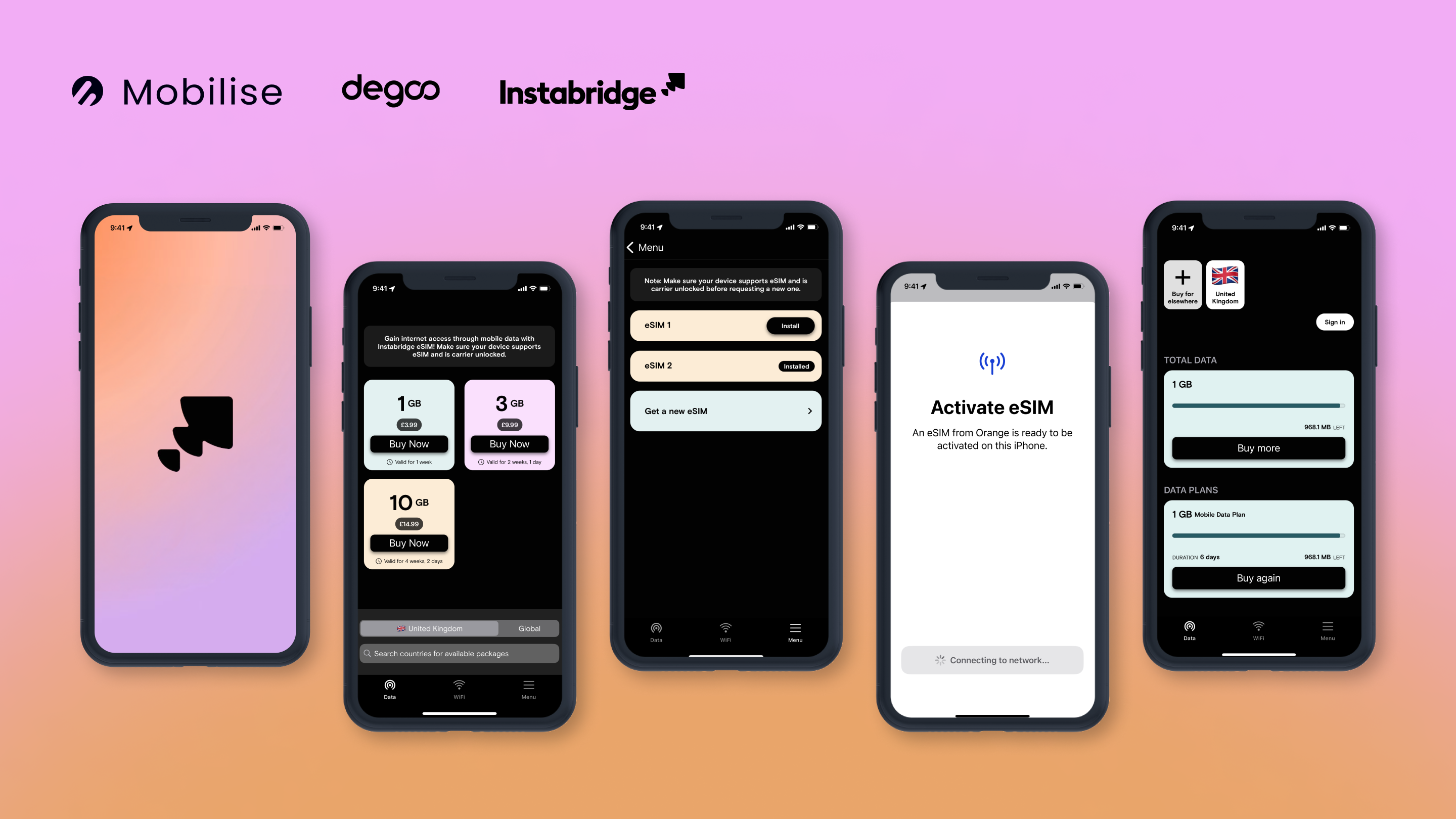 Source: Mobile eSIM SDK – Degoo Case Study
Source: Mobile eSIM SDK – Degoo Case Study
Mobile eSIM SDK offers much more flexibility than eSIM affiliate and reseller programs. It requires some backend work to embed connectivity in your app, but the effort isn’t extensive. In exchange, you get full control over the user experience and how the eSIM functionality is integrated into your user flow, ensuring the highest level of brand adherence. In the case of our SDK, remote SIM provisioning is made simple by offering a fully in-app experience, so you can forget about the QR codes and the hassle associated with them (not all eSIM SDK providers offer in-app provisioning, though).
Want to see eSIM SDK in action? Check out our interactive prototypes that show real-life scenarios:
Pros:
- Full control over branding, pricing, and customer experience.
- Seamless API integration into your existing services.
- Scalable solution for long-term growth.
Cons:
- Requires some development work.
- Higher initial setup investment.
- You need to have an existing mobile app to plug the SDK into it.
By integrating an eSIM SDK, businesses can go beyond simply selling eSIMs and create their own ecosystem of digital services. Think of eSIM as a value-added service (VAS) or ancillary service combined with travel bookings, fintech solutions, or loyalty programmes.
Key Considerations for Choosing the Best eSIM Solution
To make things easier, here’s a quick breakdown of the three models:
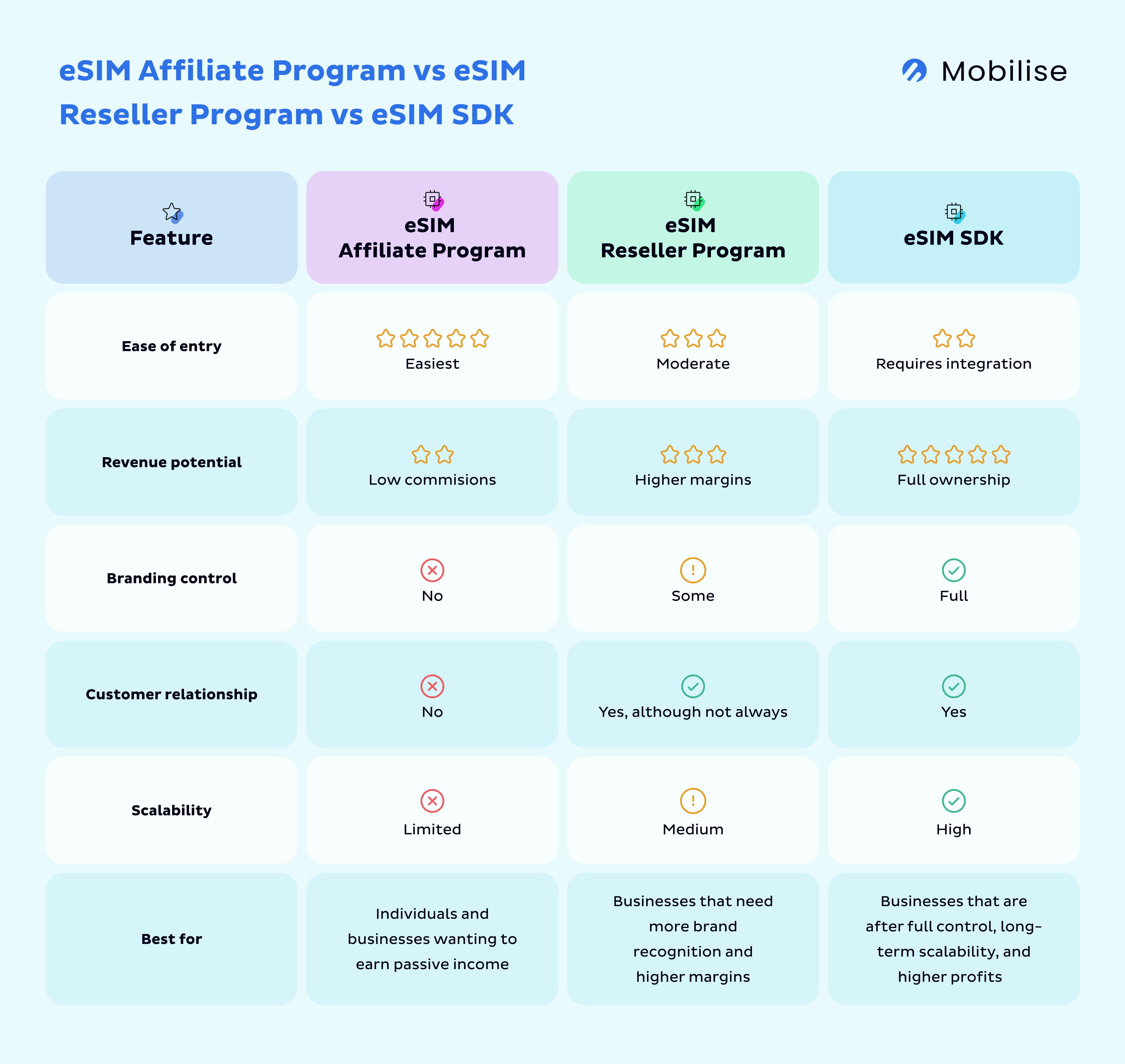
Why eSIM SDK Stands Out as the Best Choice
With so many ways to enter the eSIM market, why should businesses choose an eSIM SDK over affiliate or reseller programs? The answer comes down to customisation, scalability, and flexibility – three things that drive long-term success in the digital connectivity space.
Unlike resellers and affiliates, an eSIM SDK lets you own the entire user experience. You’re not just selling eSIMs – you’re integrating them directly into your app, ensuring that customers never have to leave your ecosystem.
Additionally, affiliate and reseller programs might work for small-scale operations, but if you’re looking to build a sustainable, high-revenue eSIM business, you need something that can grow with you. An eSIM SDK is fully scalable, meaning you can expand your service offerings globally without hassle.
Lastly, mobile eSIM SDKs are designed to be a plug-and-play solution, making integration quick and seamless. Even businesses with no telecom background can easily embed eSIM functionality into their apps, reducing development time and costs.
Conclusion
The eSIM market is growing fast, and businesses need to adapt so as not to miss an opportunity for a new revenue stream. Whether you’re looking for a low-effort side revenue (affiliate program), a branded eSIM business (reseller), or a scalable telecom solution (SDK), there’s an opportunity for you.
But if you want full control, long-term revenue, and a seamless customer experience, an eSIM SDK is the best choice.
Want to learn more about how Mobilise’s eSIM SDK can help you launch a fully branded eSIM experience? Get in touch today! 🚀



